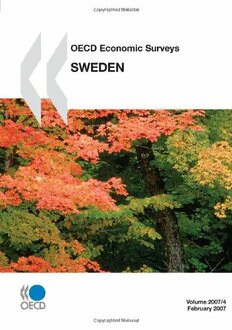
OECD Economic Surveys 2007: Sweden PDF
145 Pages·2007·1.822 MB·English
Most books are stored in the elastic cloud where traffic is expensive. For this reason, we have a limit on daily download.
Preview OECD Economic Surveys 2007: Sweden
Description:
In this 2007 edition of OECD’s periodic survey of Sweden’s economy, OECD finds strong macroeconomic performance and impressive productivity growth coupled with persistently low inflation. The expansion is set to continue. Among the challenges addressed are making employment inclusive for both immigrants and natives, and better allocation in the housing market.Table of Content : Executive Summary Assessment and Recommendations Chapter 1. Key Challenges for the Swedish Economy -Macroeconomic Performance is Strong -Impressive Productivity Growth Reflects ICT and Regulatory Reform -The Expansion is Set to Continue -Combatting Exclusion is a Key Challenge -Entrepreneurship is Held Down -Continued Fiscal Surpluses are Vital to the Long Term Annex 1.A1. Progress in Structural Reform Chapter 2. Why Has Inflation Been Persistently Low? -Inflation Has Been below Target Most of the Time -The Influence of Increased Competition and Globalisation -Implications for Monetary Policy -Conclusion -Annex 2.A1. The Giavazzi-Mishkin Report Chapter 3. Making Employment Inclusive - for Immigrants and Natives Alike -Taxes, Benefits and Work Incentives -New Policy Initiatives to Make Work Pay -Integrating Migrants -Employment Protection contra Labour Force Diversity -Sickness and Disability -Conclusion Annex 3.A1. Taxes, Social Contributions and Benefit Withdrawal, 2006 Rules Chapter 4. The Housing Market - Better Allocation via Less Regulation -House Prices and Household Indebtedness -Structure of the Housing Market -The Rent Regulation System -Fiscal Issues -Planning and Construction -Conclusion
See more
The list of books you might like
Most books are stored in the elastic cloud where traffic is expensive. For this reason, we have a limit on daily download.
